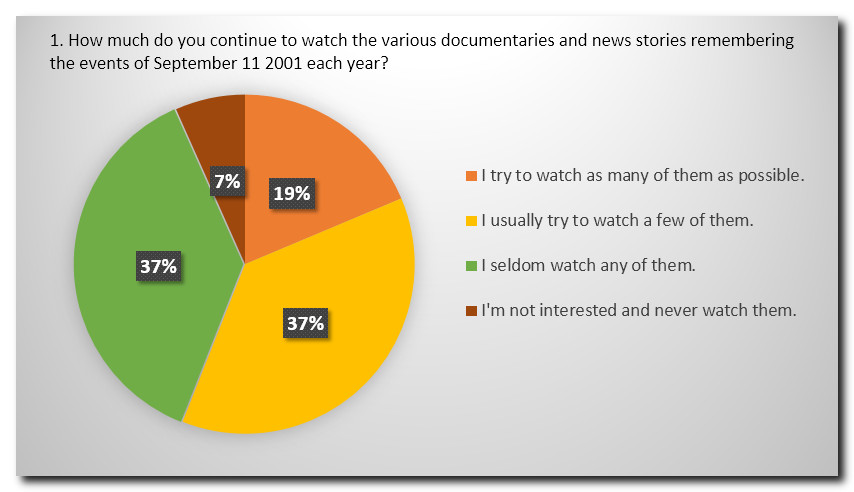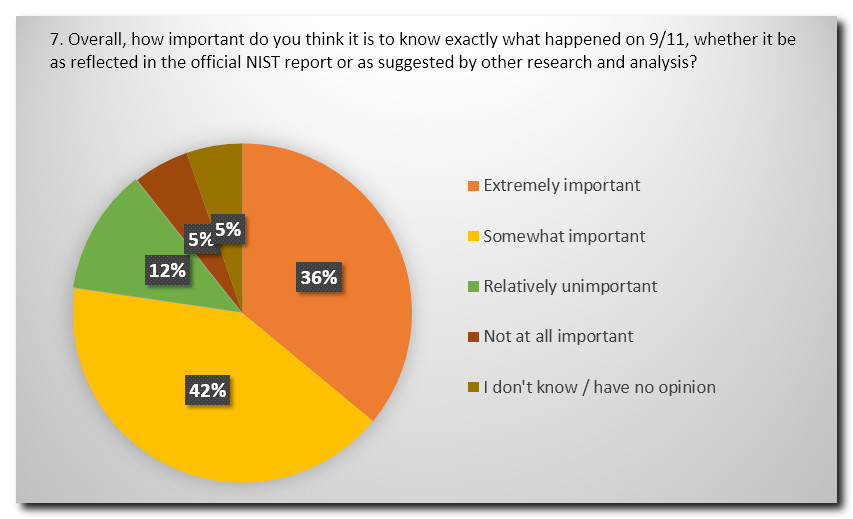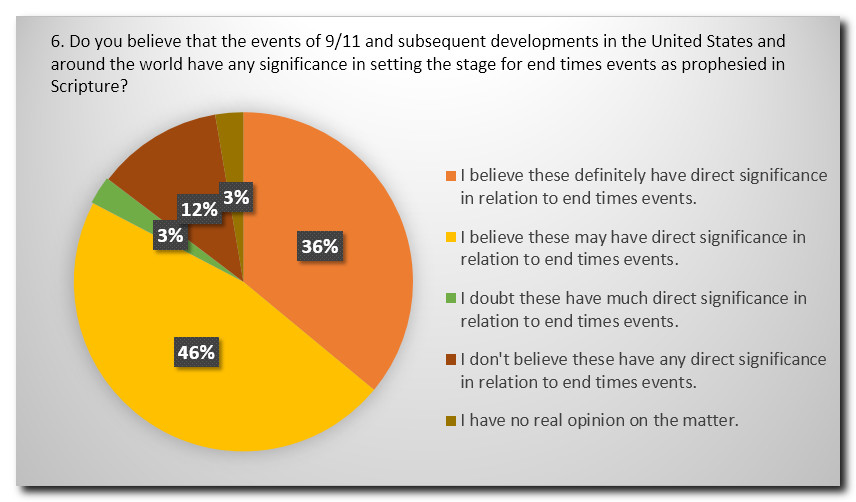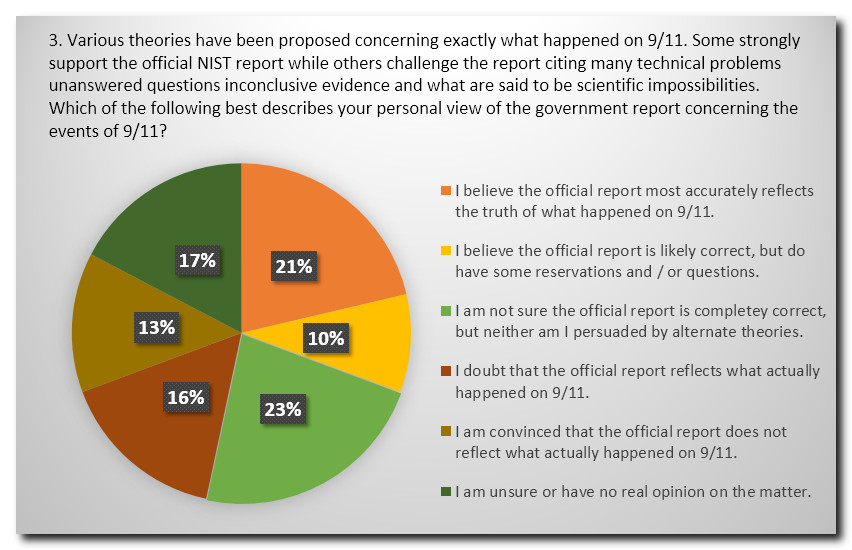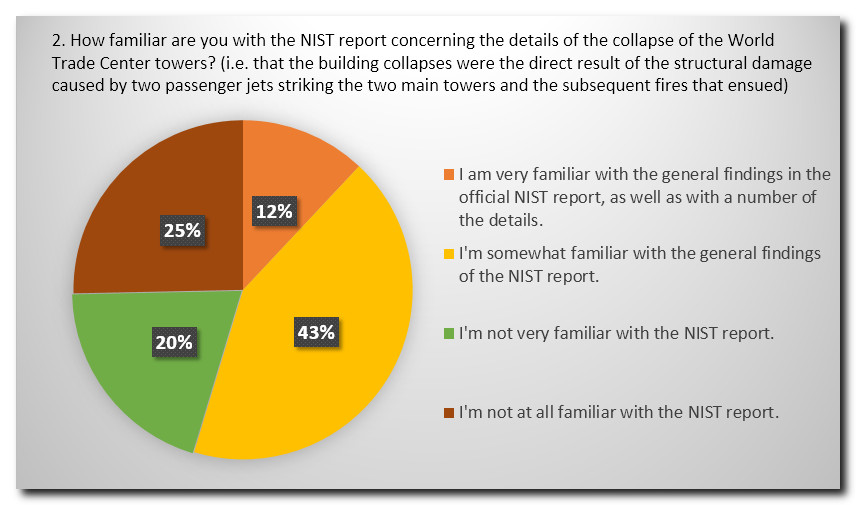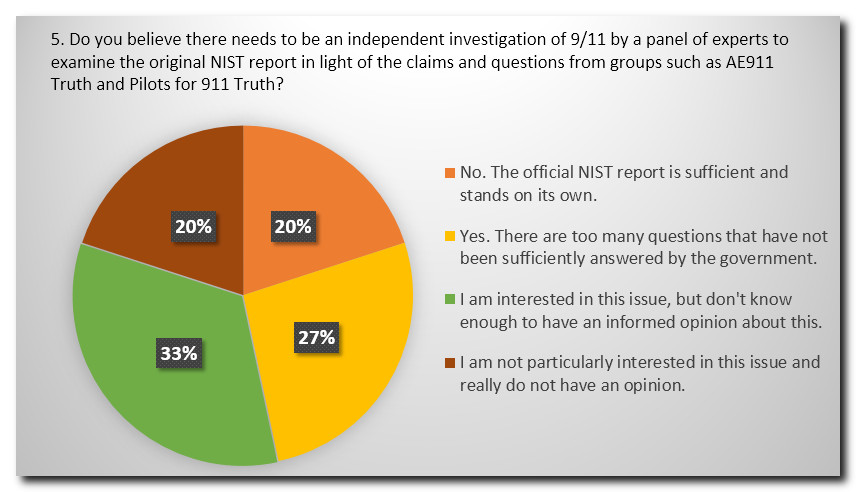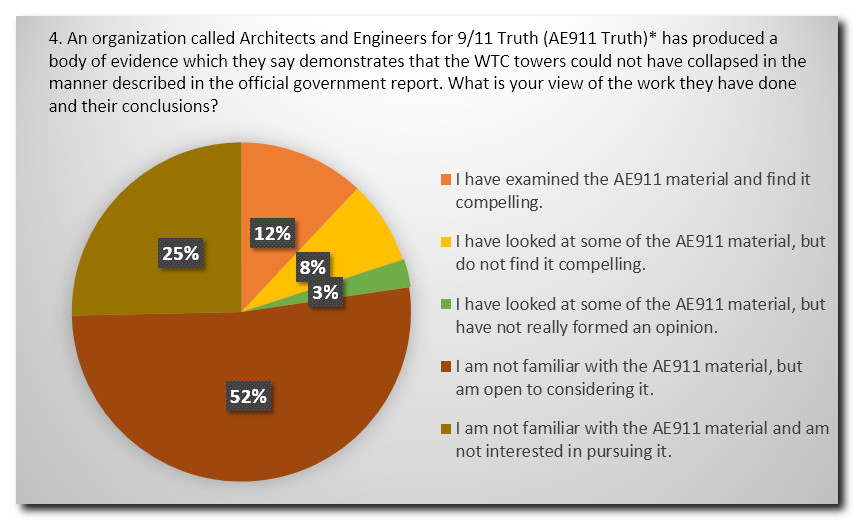9/11 Twelfth Anniversary Survey Analysis (75 respondents)
Many thanks to those who participated in this survey. You have provided very helpful feedback for helping us to understand the perspective of ABI constituents on various aspects of this subject.
If you have reached this page, but have not already taken the seven-question survey, you can do so now by clicking here. (The more data we have, the more accurate the results will be.)
Below I have provided an initial analysis of the data as it presently stands with 75 respondents. Obviously, with this relatively small sample set, the margin of error is a bit greater than I would have preferred, but I think there is enough data to at least draw some tentative conclusions. Also, it should be noted that the majority, if not all of the respondents are on the ABI Update email list, meaning that the results generally reflect the perspective of conservative evangelical believers and not necessarily the American public at large or even the broader evangelical community.
______________
The responses to this question show that even twelve years after 9/11, the majority of ABI constituents (59%) continue to be fairly interested in the events of that day, with almost one fourth (22%) being interested enough to watch as many of the 9/11 documentaries and news stories as possible. Although a sizeable minority (41%) no longer watch much about 9/11, it is apparently not because they don’t think the day continues to have ongoing significance.
An overwhelming majority of respondents (78%) believe that it is at least somewhat important to know exactly what happened on 9/11, whatever that truth may be.
These results are particularly interesting considering that only 21% have full confidence that the official NIST report tells the full and true story (see question #3 below). Therefore, although most consider knowing the truth about 9/11 as important, most are likewise not persuaded that the government has provided that truth. This seems to suggest that the majority of the respondents would welcome additional research and analysis to either confirm or deny the conclusions of the official government report. Such a conclusion is, in fact, supported by the results for question #4, as will be seen later.
The reason why so many consider knowing the truth about 9/11 of high importance seems to be reflected in the responses to question #6.
No one can deny that the world changed on September 11, 2001—in innumberable ways. And if we are living in the last of the last days, as many believe, then it would be reasonable to conclude that the events of that day had a major part in setting the stage for the coming fulfillment of end times prophecies. 46% believe this is a real possibility, while another 36% view this as a virtual certainty. When this 82% is considered in light of the fact that only about one in five (21%) fully accept the official report without reservation, this seems to suggest that many would probably like to have more satisfactory answers than they presently have.
Of course, one primary issue is the question of just how important it is for the average believer to have a clear understanding of what happened on 9/11. At the very least, it would seem that this needs to be explored more thoroughly and evaluated from a biblical perspective—something that appears to be lacking up to this point in the overall discussion
We understand that as believers in Christ who are “in the world” but not “of the world,” our worldview is to be informed and shaped exclusively by the Word of God itself. And of course the more accurately we understand history and current events the better we can appropriately bring our worldview into play on a day-to-day basis.
Only one fifth of the respondents (21%) are confident in the NIST report, while nearly one third (29%) have serious reservations that the government is being completely truthful.
If this survey represents an accurate picture of the participating demographic, then it suggests that those with questions and doubts about 9/11 no longer run the risk of being marginalized as “9/11 Truthers” or dismissed as “wild-eyed conspiracy theorists.” Either this represents a fairly significant shift in attitudes or demonstrates that more have serious concerns than has been typically portrayed over the past decade.
Another interesting result of the survey is that while only 21% have full confidence in the official NIST report (as noted above), more than half of the respondents (55%) are at least somewhat familiar with the findings in that report. This suggests that perhaps only 38% of those who know anything about the report, actually accept it as true. This is a staggering figure.
On the other hand, 45% indicated that they really aren’t familiar with the NIST report, which means that at most, almost half of the respondents are basing their views and opinions (if they have one) on nothing more than the narrative set forth by the media and the government. Once again, if the relative importance of that day is as high as the survey indicates, then it would seem to be premature to conclude that the last chapter has really been written about 9/11.
Once again, the survey results consistently affirm that only about one in five are satisfied that no further work needs to be done to ascertain the full truth of what happened on 9/11, while 27% are at the opposite end of the spectrum, believing that the matter needs to be revisited, perhaps through an independent investigation.
The combined results of the second and third answers show that a total of 60% have an interest in the issue, although over 50% of those don’t believe they know enough to have an informed opinion. This, too, suggests, that more work would be welcomed.
Finally, an analysis of the responses to this question provides further interesting insights into the overall issue.
The first observation is that fewer than 25% are even familiar with the AE911 material that challenges the official government report, but of those who have seen it, fully half find it compelling. This obviously raises the question about what these results would look like – and what the results of the entire survey would look like if all the respondents were to view at least some of the AE911 material. Although 25% of the respondents expressed no interest in viewing the material, the question remains as to whether half of these, too, would find it compelling if they did watch it.
Although three fourths of the respondents are not familiar with the AE911 material, two thirds of those would be open to consider it. Once again, the responses indicate that many are not certain that they know everything there is to know about 9/11.
One thing that must be remembered is that, at least for the time being, in contrast to typcial conspiracy theories, no attempt is being made to determine why anything happened or who was involved. The only present consideration is the official NIST report which contends that the three Word Trade Center towers collapsed exclusively due to two passenger jets hitting the two main towers. Hundreds of building professionals are convinced that it couldn’t have happened that way – and, in this survey at least, over 50% of those who have viewed even some of the evidence assembled by these professional have agreed with their assessment.
In total, these results lead to some additional questions which will be the focus of a follow-up survey such as:
1.
Is it time for a conservative evangelical ministry to take this on as a project to bring some biblical perspective on the implications of something broader than a limited terrorist plot playing out on September 11, 2001?
